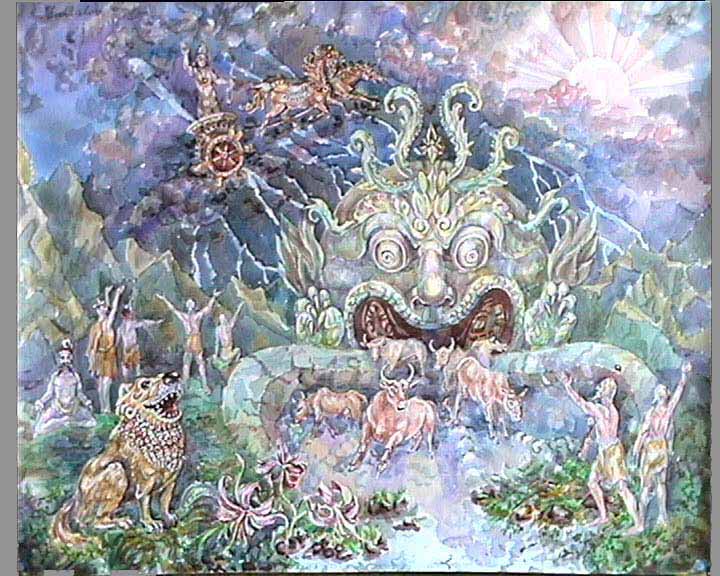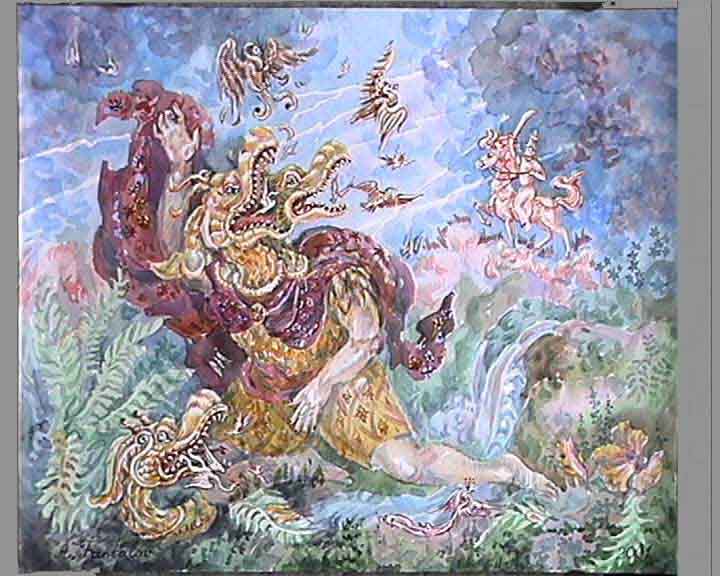ManishH wrote:RV X.121 seems to indicate that Rasa was the extremity of known landmass at the time... the Rasa is quoted along with Snow clad mountains and the sea which are the other extremities of the known landmass. Or maybe Rasa just denotes the Rasatala.यस्येमे हिमवन्तो महित्वा यस्य समुद्रं रसया सहाहुः
Atri: Not to refute an otherwise western movement (by Druhyus and Anus), but I think Panis were southern or eastern people.
But ManishH ji, the verse you quoted is from famous Hiranyagarbha sukta. (one of my favourites, again showing the atheistic spark in Vedics - Kasmai devaaya havisha vidhem?) Hiranyagarbha sukta is the question and Naasadiya sukta is the answer..
anyways.. the word here is Rasayaa (रसया) and not rasaayaa (रसाया).. the river is rasaa..
the references to saramaa are as follows
1. इन्द्रस्याङगिरसां चेष्टौ विदत सरमा तनयाय धासिम |
बर्हस्पतिर्भिनदद्रिं विदद गाः समुस्रियाभिर्वावशन्त नरः || - RV 1.62.3
When Indra and the Aṅgirases desired it, Saramā found provision for her offspring.
Bṛhaspati cleft the mountain, found the cattle: the heroes shouted with the kine in triumph
2. सवाध्यो दिव आ सप्त यह्वी रायो दुरो वय रतज्ञा अजानन |
विदद गव्यं सरमा दर्ळ्हमूर्वं येना नु कं मानुषीभोजते विट || - RV 1.72.8
Knowing the Law, the seven strong floods from heaven, full of good thought, discerned the doors of riches.
Saramā found the cattle's firm-built prison whereby the race of man is still supported.
3. विदद यदी सरमा रुग्णमद्रेर्महि पाथः पूर्व्यं सध्र्यक कः |
अग्रं नयत सुपद्यक्षराणामछा रवं परथमा जानती गात || RV 3.31.6
When Saramā had found the mountain's fissure, that vast and ancient place she plundered thoroughly.
In the floods' van she led them forth, fair-footed: she who well knew came first unto their lowing.
4. अनूनोद अत्र हस्तयतो अद्रिर आर्चन येन दश मासो नवग्वाः |
रतं यती सरमा गा अविन्दद विश्वानि सत्याङगिराश चकार || RV 5.45.7
विश्वे अस्या वयुषि माहिनायाः सं यद गोभिर अङगिरसो नवन्त |
उत्स आसाम परमे सधस्थ रतस्य पथा सरमा विदद गाः || RV 5.45.8
Here, urged by hands, loudly hath rung the press-stone wherewith Navagvas through ten months sang praises.
Saramā went aright and found the cattle. Aṅgiras gave effect to all their labours.
When at the dawning of this mighty Goddess, Aṅgirases all sang forth with the cattle,—
Their spring is in the loftiest place of meeting,—Saramā found the kine by Order's pathway.
5. अपो यद अद्रिम पुरुहूत दर्दर आविर भुवत सरमा पूर्व्यं ते |
स नो नेता वाजम आ दर्षि भूरिं गोत्रा रुजन्न अङगिरोभिर गर्णानः || RV 4.16.8
When, Much-invoked! the water's rock thou cleftest, Saramā showed herself and went before thee.
Hymned by Aṅgirases, bursting the cow-stalls, much strength thou foundest for us as our leader.
References for Rasaa river
मा वो रसानितभा कुभा करुमुर मा वः सिन्धुर नि रीरमत |
मा वः परि षठात सरयुः पुरीषिण्य अस्मे ईत सुम्नम अस्तु वः || RV 5.53.9
So let not Rasā, Krumu, or Anitabha, Kubha, or Sindhu hold you back.
Let not the watery Sarayu obstruct your way. With us be all the bliss ye give.
Kramu river is modern Kurram river in Waziristan. Kubha is modern day Kabul river. Sarayu river here can be Hari-rud river in Herat province today. In avestan, it is harayu.. It may also be our sarayu river in awadh. but why mention it in same line as kabul and kurram? furthermore, Sarayu in awadh is not a big river in the region. We have Ganga which is huge. The hari river of herat is one of the biggest in that region (in comparison). I do not know which is anitabha river. hence it is possible that rasaa too was one of the western rivers. hence the westward hypothesis. This verse is dedicated to marut (wind) blowing westward..
Now the Saramaa-Pani dialogue happening on the banks of rasaa river
Rigveda 10.108
किमिछन्ती सरमा परेदमानड दूरे हयध्वा जगुरिःपराचैः |
कास्मेहितिः का परितक्म्यासीत कथं रसायातरः पयांसि ||
इन्द्रस्य दूतीरिषिता चरामि मह इछन्ती पणयो निधीन्वः |
अतिष्कदो भियसा तन न आवत तथा रसाया अतरम्पयांसि ||
कीद्रंं इन्द्रः सरमे का दर्शीका यस्येदं दूतीरसरः पराकात |
आ च गछान मित्रमेना दधामाथागवां गोपतिर्नो भवाति ||
नाहं तं वेद दभ्यं दभत स यस्येदं दूतीरसरं पराकात |
न तं गूहन्ति सरवतो गभीरा हतािन्द्रेण पणयः शयध्वे ||
इमा गावः सरमे या ऐछः परि दिवो अन्तान सुभगेपतन्ती |
कस्त एना अव सर्जादयुध्व्युतास्माकमायुधासन्ति तिग्मा ||
असेन्या वः पणयो वचांस्यनिषव्यास्तन्वः सन्तु पापीः |
अध्र्ष्टो व एतवा अस्तु पन्था बर्हस्पतिर्व उभया नम्र्ळात ||
अयं निधिः सरमे अद्रिबुध्नो गोभिरश्वेभिर्वसुभिर्न्य्र्ष्टः |
रक्षन्ति तं पणयो ये सुगोपा रेकु पदमलकमा जगन्थ ||
एह गमन्न्र्षयः सोमशिता अयास्यो अङगिरसो नवग्वाः |
त एतमूर्वं वि भजन्त गोनामथैतद वचः पणयोवमन्नित ||
एवा च तवं सरम आजगन्थ परबाधिता सहसा दैव्येन |
सवसारं तवा कर्णवै मा पुनर्गा अप ते गवां सुभगेभजाम ||
नाहं वेद भरात्र्त्वं नो सवस्र्त्वमिन्द्रो विदुरङगिरसश्च घोराः |
गोकामा मे अछदयन यदायमपात इत पणयोवरीयः ||
दूरमित पणयो वरीय उद गावो यन्तु मिनतीरतेन |
बर्हस्पतिर्या अविन्दन निगूळाः सोमो गरावाण रषयश्च विप्राः ||
1. WHAT wish of Saramā hath brought her hither? The path leads far away to distant places.
What charge hast thou for us? Where turns thy journey? How hast thou made thy way over Rasā's waters.
2 I come appointed messenger of Indra, seeking your ample stores of wealth, O Paṇis.
This hath preserved me from the fear of crossing: thus have I made my way o’er Rasā's waters.
3 What is that Indra like, what is his aspect whose envoy, Saramā, from afar thou comest?
Let him approach, and we will show him friendship: he shall be made the herdsman of our cattle.
4 I know him safe from harm: but he can punish who sent me hither from afar as envoy.
Him rivers flowing with deep waters bide not. Low will ye be, O Paṇis, slain by Indra.
5 These are the kine which, Saramā, thou seekest, flying, O Blest One, to the ends of heaven.
Who will loose these for thee without a battle? Yea, and sharp-pointed are our warlike weapons.
6 Even if your wicked bodies, O ye Paṇis, were arrow-proof, your words are weak for wounding;
And were the path to you as yet unmastered, Bṛhaspati in neither case will spare you.
7 Paved with the rock is this our treasure-chamber; filled full of precious things, of kine, and horses.
These Paṇis who are watchful keepers guard it. In vain hast thou approached this lonely station.
8 Ṛṣis will come inspirited with Soma, Aṅgirases unwearied, and Navagvas.
This stall of cattle will they part among them: then will the Paṇis wish these words unspoken.
9 Even thus, O Saramā, hast thou come hither, forced by celestial might to make the journey.
Turn thee not back, for thou shalt be our sister: O Blest One, we will give thee of the cattle.
10 Brotherhood, sisterhood, I know not either: the dread Aṅgirases and Indra know them.
They seemed to long for kine when I departed. Hence, into distance, be ye gone, O Paṇis.
11 Hence, far away, ye Paṇis! Let the cattle lowing come forth as holy Law commandeth,
Kine which Bṛhaspati, and Soma, Ṛṣis, sages, and pressing-stones have found when hidden.








